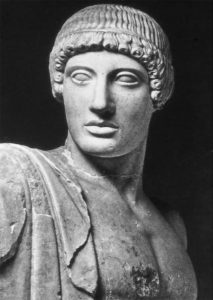Who was the god Apollo in Greek Mythology
Apollo was one of the twelve gods of Olympus, god of light, divination, music, harmony and order in the world. He was the son of Zeus and Leto and was born together with his twin sister, Artemis, on the sacred island of Delos, where Leto had taken refuge to avoid the jealousy and anger of Hera. Apollo is described as a very handsome god, tall, with long black tusks, blue eyes streaked like pansy petals
In the autumn, Apollo left Greece for the country of the Hyperboreans, and in the spring he returned again on a chariot drawn by swans. He was worshiped in many places and the faithful had dedicated many sanctuaries to him, the most important being those of Delos and Delphi, where the god had founded the most important oracle of ancient Greece, after first killing the mythical dragon Python, which is why he was called Pythios . There, through the Pythia, he gave his oracles, which were ambiguous, and that is why he was also called Loxias..
This is a summary of the information one finds about the god Apollo in print and online dictionaries. In more detail, we derive information and conclusions about the existence and origin of the god in particular from the myths related to his birth, the women with whom he is romantically involved (who they are, where they come from), the descendants (attributes, places to which they go ), generally his family tree, his talking symbols, the animals that accompany him. And also: from his wanderings, his own or those of his people, relatives or others related to his cult, from the epithets attributed to him, from the visual representations, from the sanctuaries (the place where they are founded, the time of their foundation ).
The evidence that emerges from all this information shows that Apollo, although considered a Doric god brought with them by the Doric tribes, was nevertheless worshiped earlier in Mycenaean centers. Gradually, and with the advent of the Dorians, the god submitted to the rule of Zeus as his son, as did Leto’s mother through her marriage to Zeus, as well as his sister Artemis, who while she had been a maternal super-goddess of nature, she not only submitted herself as a daughter to Zeus but was drawn up next to a male brother.
Apollo appears in many myths as a shepherd. For example, while Poseidon was walling Troy, he was tending Laomedon’s flocks at Ides, both punished by Zeus for conspiring against him. Again punished by Zeus for killing the Cyclops, he entered the servile service of the king of the Pherae, Admetus, as a shepherd of his flocks. The oxen of these herds were stolen by the illustrious brother of Hermes, still an infant, in the velds, and cunningly tried to hide their tracks. He exchanged them for the lyre which he gave to his brother and of which he was the finder; later the two brothers exchanged the syringa or flute, Hermes for the golden glitsa given to him by Apollo, the later caduceus, symbol of the god Hermes. Thus, the two gods were reconciled to each other through a process of exchange, a common tactic in privileged society, and through the clear demarcation of their territory
Inclusion of Apollo in the twelve gods
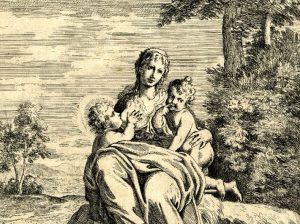
Artemis was born there first and helped her mother give birth to her brother. According to another version, Hera decreed that Leto should not give birth in a place where the sun sees him. But Boreas, obeying the orders of Zeus, led Leto to Poseidon, who created a dome of water over the island of Delos. Thus, a virgin place was “made” for Leto to give birth to her children. However, this was not possible without the presence of the goddess of childbirth, Eileithyia, and despite the presence of all the other goddesses, except of course Hera.
For nine days and nights, Leto ached at the root of the island’s only tree, a palm tree, until the goddesses sent the messenger of the gods Iris to Olympus, to convince Hera to let Eileithyia come down to the island and help the afflicted woman. He even ordered her a necklace nine cubits long of gold and amber. Thus Apollo was born. And as it was the seventh day of the month, swans flew seven times over the island at the time the god was born.
A golden mitre, a lyre, and a swan-laden chariot were the gifts of Zeus to his son, and he appointed him to proceed at once to Delphi. But the swans led Apollo first to their country, to the country of the clear-sky Hyperboreans, to the shores of the Ocean beyond the North Wind, who established worship in the god’s honor unceasingly. Apollo stayed there for a year and then came to Delphi and founded his oracle. And every year they celebrated the coming of the god with centumbes.
Another tradition wants Leto to transform into a wolf, to escape from Hera, and to return to her residence in the land of the Hyperboreans, to give birth. This explains the god’s epithet lycogenes, that is, born of a wolf. Or why wolves helped Leto, when, after giving birth, she went to the land of Tremilida with the two new-borns, she stopped at a spring or lake to bathe them, but she was prevented by goblins. The goddess, with the help of the wolves, transformed them into frogs and renamed the country Lycia in their honor.
In the places through which Leto passed with a stomach ache, Apollo finally invaded and his worship was imposed. As for Delos, she was rewarded by the god; she was fixed with four columns at the bottom of the sea and renamed from Ortygia, as the immortals called her, to Delos, which means clear or bright, brilliant, because she revealed the god Apollo, his god light.
However, although he comes under Zeus, even with a brilliant birth, nevertheless the Olympians, and Zeus, honor him separately. Leto’s mother also enjoys special privileges next to Zeus. However, he endured the punishment of Zeus at least twice; once when he killed the Cyclops, to avenge the death of Asclepius’ son; and again when he conspired with other gods , Athena, Hera, Poseidon, to handcuff Zeus with iron chains and hang him from the sky.
When he was freed, she imposed on him, along with Poseidon, servile service in the form of mortals for a year to the Trojan king Laomedon. And he ordered that the city be walled; both the gods, or only Poseidon and Aiacus, did the work, while Apollo tended the king’s flocks on Mount Idis.
But Laomedon refused to give them the pay they had agreed upon, and even threatened to cut off their ears and sell them as slaves. And Apollo sent a pestilence to the city, and Poseidon a cetus that, with the overflow of the waters, came out into the plain and seized the people, until Heracles freed them from their sufferings. But even then Laomedon did not give the promised reward.
Apollo a punishing god and warrior
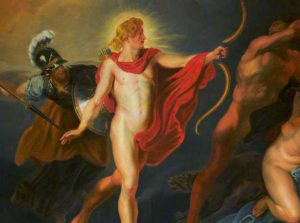
He punishes with pestilence or with his bow or just with his gaze. He punishes the Achaeans in Troy for Agamemnon’s abusive behavior to Chryses and the refusal of his plea, the Thebans, because the dead king Laius was left unjustly – no one searched for his murderer, the Centaurs for the lack of moderation and the violation of the law of hospitality, as they rushed to seize the bride of the wedding to which they were invited; Niobe who boasted that she had more children than Leto’s mother; with his sister Artemis took part in the Gigantomachy and killed the Giant Tityus, his son Zeus and Elara, because he tried to rape their mother Leto on her way to Delphi.
Apollo, lyre player and musician
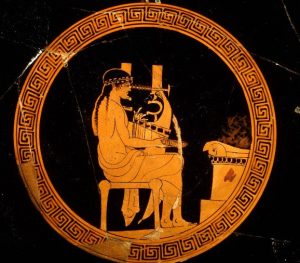
Thus, the beginning and the end of the rhapsody present the two aspects of the god, a punishing archer and an entertainer with his guitar, but which are united in the oscillation of the strings of the guitar and the bow.
The Herakleian do not get angry when the different agrees with itself; Palinton harmony between the bow and the lyre .
They do not understand that the different agrees with itself; harmony of opposite intensities as in the bow and the lyre , finds here its mythological application
Apollo the god of divination
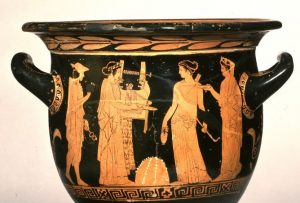
When he arrived at Delphi, he had to kill the dragon that guarded the spring near the old oracle and which, according to the Souda dictionary, was called Delphinis. When Apollo took over the place, he killed the dragon.
The place, Delphi, was named after him, as well as the priestess of Apollo, Pythia, and the god himself, Pythios, because this snake was buried and rotted there – pytho = to rot. In the Homeric hymn the dracaena of the old oracle was anonymous and only later was she named and called Delphina or Delphine. This dragon is different from the Python dragon of Delphi, which guarded the oracle, where Themis prophesied; this must be a later and successive form of the myth.
Apollo’s mistresses and children
Most of Apollo’s mistresses are Muses (Thaleia, Calliope, Urania etc) or fortune tellers (Manto, Cassandra), while his children are engaged in music (Linos, Orpheus), divination (Mopsos), medicine (Asclepius) – that is why Asklepiia are often found near sanctuaries of Apollo. Several of his children manifest the solar character of their father with all the beneficial as well as destructive and cathartic effects of solar energy, while others are founders of tribes (Ion, Doros) or settlers.
Apollo and Daphne
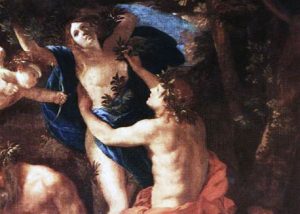
And to Daphne, as to many figures in mythology, different parents are attributed. Sometimes she is the daughter of the river Ladon of the Peloponnese and Earth, sometimes of the Thessalian river Pinios, sometimes of King Amyklas of Laconia.
Daphne is the antitype of the daughter subject to the social norms of marriage. As a female Hippolytus and beloved nymph of Artemis, Apollo’s sister, she spent her time in the mountains, avoiding the company of men and hunting. And for this virgin nymph problems arise with love. Leucippus, the son of the king of Elis, Oenomaus, fell in love with her.
The young man quickly gave up trying to make her his wife, but he devised a trick to be near her: He braided his hair, which he let grow long to offer to the river Alpheus, he dressed as a daughter, presented himself to Daphne as daughter of his father and begged her to let him hunt with her. The friendship that developed between them aroused the jealousy of Apollo who, wanting to take revenge, instilled in the girls the desire to bathe in the waters of the river. They forced the reluctant Leucippus to undress, discovered his true gender and killed him with their spears and knives. According to other versions, the gods made him invisible. Apollo then rushed to grab Daphne.
Chased by the daughter, she ran until the moment when, as she was about to catch her, she asked her father Pineos to transform her. He was transformed into a laurel, the god’s favorite plant, which he would henceforth wear on his head. The funeral procession would reach all the way to the head of political power in Rome
Apollo and Rhoio
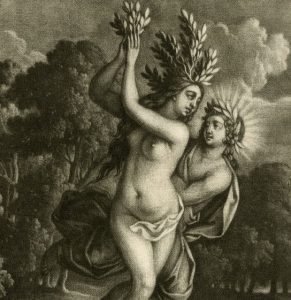
The urn washed up on the coast of Evia, according to one version, where Rhoio gave birth to her son Anio. Immediately afterwards Apollo took mother and child to Delos and gave Anios the power of the sacred island and the gift of divination.
Diodorus Sikeliotis reports that the larnaca washed up directly on Delos, without the Euboean mediation, and there Rhoio gave birth to her child. Roio laid the child on the altar of Apollo and prayed to the god to save the child’s life if it was his. And Apollo hid the child but later took care of his upbringing, taught him fortune-telling and surrounded him with great honours.
Apollo and Thyrei
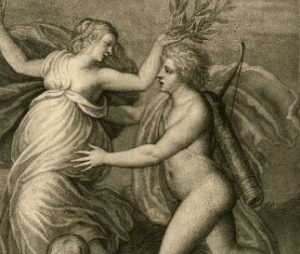
Many fell in love with him for his beauty, but the Cygnus arrogantly rejected them all and disappointed them, as a result of which they abandoned him one after the other, except for the beautiful Phylio, who, however, the Cygnus treated him arrogantly and each time put him a test, which he was carrying out.
The Swan, out of shame and rage, fell into Lake Konopi and perished. Out of her sorrow for the death of her son, Thyria also fell into the same lake. By Apollo’s decision the two of them became birds of the lake and the people renamed it Cycneii. In this, during the plowing season, many swans appeared
Apollo and Psamathi
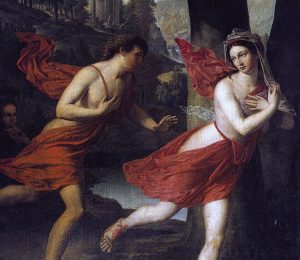
Except that the king’s dogs devoured it, and Apollo sent Punishment to the Argives as punishment, who snatched the babies from the arms of their nursemaids. Until the Argive Corivos exterminated her.
Pausanias reports that on the tomb of Corivus in the market of Megara were engraved elegiac verses that mentioned the story of Psamathi and a performance of Corivus at the time he killed Poini. The story of Corivus after the death of Poini is connected with the founding of the city of Tripodis in the Geranian mountains and the construction of a temple in honor of the god .
According to another version, the father did not believe that his daughter’s child was Apollo’s, and therefore sentenced her to death. Enraged, Apollo sent a plague to the area.
Apollo and Dryope
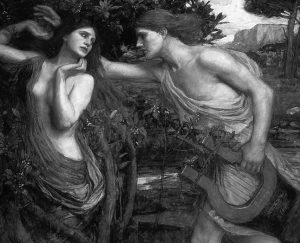
There, the god Apollo saw her dancing and fell in love with her. To make her his own he first transformed into a turtle, with which the Nymphs and the daughter began to play as if it were a ball. As soon as Dryope tenderly took the animal in her arms, Apollo transformed into a snake.
The Nymphs got scared and ran away. Thus the god Apollo managed to achieve his plans. Dryopi returned to the palace in fear without saying anything to anyone. After some time she married Andraemon, son of Oxylus, and gave birth to a child, Amphissus, whose father was Apollo. Amphissus, when he grew up, became the king of the region and built a city that he named Oiti after the mountain. Nearby he also built a temple for his father Apollo.
Apollo and Kyparissos
The beautiful young Kyparissos, son of Telephos from Keos, was in love with the god Apollo (or Zephyrus, or the Roman god Silvanus or Siluanos). He was inextricably linked with a domesticated sacred deer that always accompanied him.
That is why when he unwittingly killed with his spear his deer that was sleeping in the shade of a tree, his mourning was great. So he asked the gods to die but to let his tears flow eternally. So the gods transformed him into a cypress tree. The tree with the dark green color became the tree of sorrow and its fruit the crystallized tears of the Cypress.
Adjectives of Apollo
The epithets with which the god was worshiped reveal his attributes and powers:
Agyeus = protector of doors
Akersekomis = the one who has the komen not kekarmenen, aei young, hence also Kurotrophos (protector of youth). Indeed, the god is rarely shown with a beard.
Anax and chieftain; genetor; epicurean.
Delphinium or Delphinus. The relationship of the god with the sea is indirect due to his place of birth, which his believers only approach by sea. The appearance of the dolphins was an indirect approval of the god for their pilgrimage. He himself, in the form of a dolphin, will lead the Cretans to the region of Crisa, to become the first priests of Delphi.
Argyrotoxos, Toxophoros, Ekatos, Hekativolos, Ekivolos, Hekativeletas, Hekaergos (from ἑkas = far away). As an archer and archer, the god appears at the beginning of the Iliad (A 43-53).
Karteros (=brave), because of his connection with war
Loimios (= one who causes plagues), Physician, Paiaon (Grammiki B’), Akestor and Akesios (= healer), Alexikakos, Apotropaios.
Musagetas or Musegetes, Nymphegetes, Euymnos, Kitharodos, Ipaion (< paean), because of his connection with music, the Muses and the Nymphs.
The epithets Aiglitis, Lykios, Lykigenis, Lykoktonos, Helios, Fanaios, Chrysaor are connected to the light and color of the sun.
Phoebus (= pure, holy) from Themis’s sister Phoebe, Thurios from Chaero’s mother Thuro, Pythios from the serpent Python Telphusius, from the nymph Telphusa and Mount Telphusius, near Copaid, where Apollo would establish his sanctuary displacing the nymph, if she had not cunningly directed him to Crisa, to Parnassus; the god avenged her by providing her waters. All three last epithets are associated with his struggles to prevail in the sanctuary of Delphi.
The epithets Smintheus (protector of agriculture), Nomios (protector of shepherds and herds), Parnopius (he who drives away locusts) Agraios (protector of hunters) are linked to the regularity of agricultural work, as determined by the movement of the sun and the season and associate the god with the land and the crops.
Club limit for the protection it afforded to club meetings.
Delios, from the place of his origin, Kynthios and Kynthogenes (from Mount Kynthos of Delos).
Gemini, because he is a twin with Artemis.
Clarios from his oracle at Claros, Akraifiaios from the Boeotian city Akraifia, where he was worshipped.
Soothsayer and soothsayer, soothsayer, soothsayer, because he gave oblique oracles, i.e. ambiguous ones.
The god’s epithets are generally related to his solar qualities, music, martial art, and consequently also his healing qualities, his struggles until he dominates a place.
Summary and Conclusions
Apollo appears as the god of the sun, music, harmony, divination. As the god of the sun, with his constant periodicity, he brings order to nature, on him, the sun, depend agricultural work, the prosperity and destruction of crops[5] which causes disorder in the lives of people – from the moment it is intertwined with order necessarily linked with disorder. Music is also intertwined with harmony, and so is divination, as the knowledge it offers brings order to the chaos caused by ignorance.
The evidence points to Prodorian and Eastern origins for the god and that he was then subordinated to the Olympian pantheon as the son of Zeus. We list the evidence that demonstrates the worship of the god before the descent of the Dorians:
1. Ionas and Doros are his sons.
2. Its sanctuaries from the archaic era onwards, e.g. in Delos or Delphi, have a supra-local and pan-Hellenic character, while his sanctuaries in Miletus and Colophon are older than the Ionic and Doric migrations, as is evident from the archaeological excavations and from the sources
3. The establishment of worship in the above Asia Minor cities was done by Cretans, while Cretans were also the first priests in the oracle at Delphi. This fact seems to be a connecting link with the heyday of Crete before the descent of the Dorians and the first Greek colonization.
3. Apollo is associated with purity. He purges himself for the killing of Python, the serpent that guarded the source of Delphi, by the Cretan priest Karmanoras , he himself purges Orestes from his mother’s murder. But Cretan priests, such as Karmanoras and Epimenides, who cleansed Athens of the Cylonian agos in 596 BC, were experts in cleansing.
4. The lions at his shrines or by his side indicate his eastern origin, like the panther to Dionysus, and not the northern.
5. The connection of the god with the East is also shown by the fact that the oracle at Delphi was arranged in a friendly manner towards the Persians during the Persian wars, while earlier the king Alyattis and later his son Croesus had asked Apollo for an oracle.
6. Moreover, Apollo is friendly to the Trojans, whom he consistently helps.
7. From the wanderings of the mother of the god, himself and the ship that brought to Delphi the Cretans who would become his first priests, the spread of the cult of Apollo is indicated with an emphasis on his Cretan origin and his eastern origins.
8. His column-shaped or pesso-shaped depictions, the epithet Agyieus (from ἐγιὰ = street, avenue) as guarding streets and avenues or the house in the form of a pointed column or obelisk set in front of the door, his relationships with Hyacinthos and Cypress , pre-Hellenic gods of vegetation as their names reveal, suggest the pre-Dorian origin of the god but also his expanded properties and chthonic characteristics.[6]
9. It is related to female deities, who dominated the worship of the Aegean and mainland Greece before the twelve gods and who precede Zeus chronologically and in the genealogical trees. Thus, Leto’s mother and Artemis’ sister reflect chthonic worship of maternal deities. In addition, the god displaces Gaia from Delphi, from whom he inherited the navel, or receives it as a gift from Phoebe, sister of Gaia’s successor in the oracle, Themis – hence the surname Phoebus. His sanctuary at Delphi was dominated by the demonic female Sphinx, on an Ionic column 12.10 m high; she is associated with riddles, the riddles of life, which the faithful went to the oracle to solve by receiving an equally puzzling oracle from the mouth of the Pythia; of course, the most enigmatic of all enigmas was death.
Conclusions
The hyperlocal character of the sanctuaries of Apollo, the Cretan origin of his priests in Delphi and some of his sanctuaries in Asia Minor, the Cretan starting point of the wanderings of his mother Letos until she gave birth to him on the island of Delos, the Cretan origin of the purification ritual , the relationship of the god with chthonic deities that precede the rule of Dodecatheus, the fact that he is accompanied by lions, all these demonstrate a god worshiped in the Greek area before the descent of the Dorians, i.e. Prodoric, with origins in Crete and the East . With the advent of the Dorians the god was incorporated into their worship, acquired other attributes and submitted to the rule of Zeus as his son. So was the mother of Leto by marriage, and so was the sister of Artemis, who, while a potnia of beasts, a motherly super-goddess of nature, was not only subordinated as a daughter to Zeus, but also married to a male brother.

